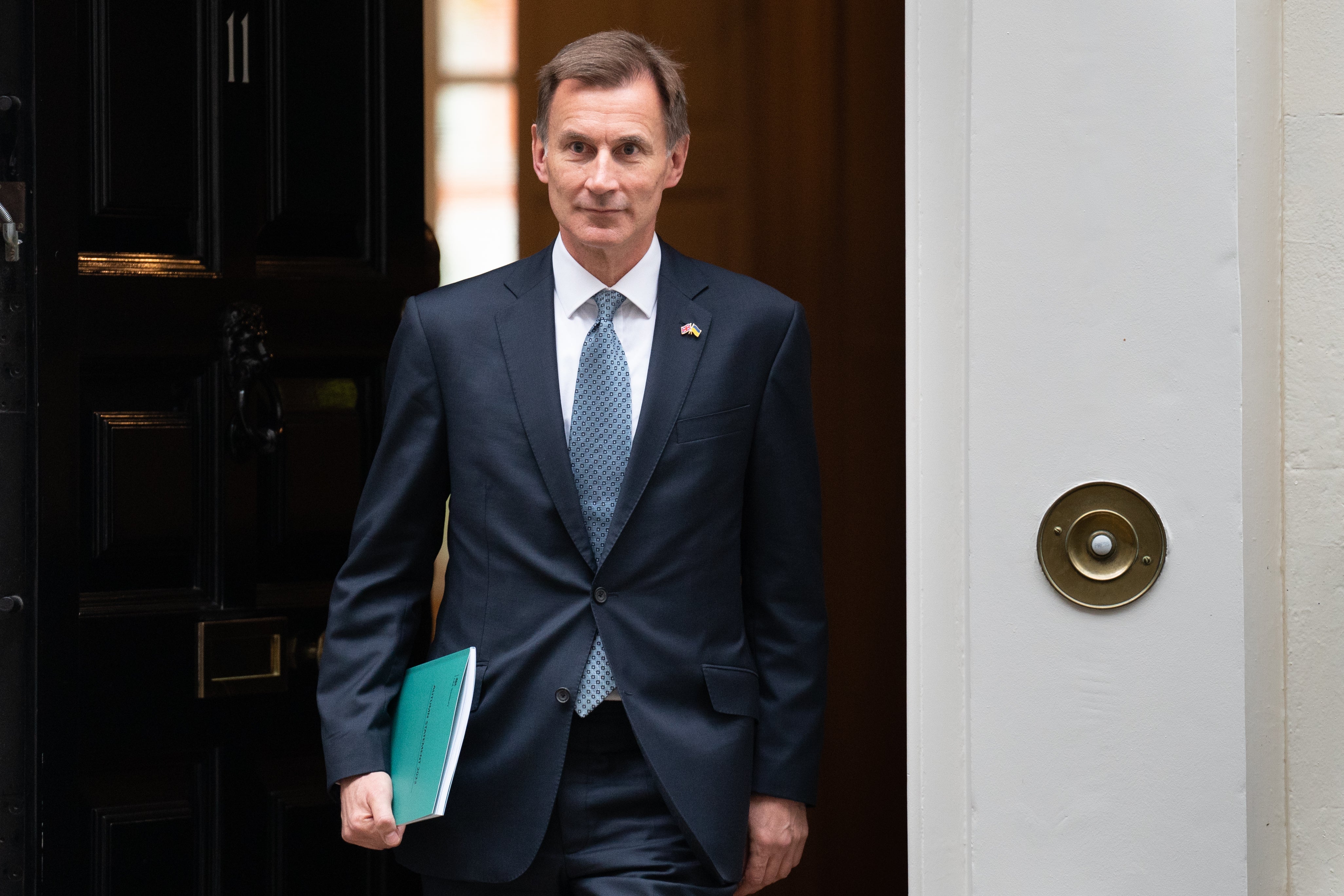Prudent Hunt will offer some Budget red meat – but who will benefit?
The chancellor is coming under pressure from his backbenchers over tax, writes James Moore


Will Jeremy Hunt use his fiscal wiggle room to prioritise public services, the economy, or the Tory party in this week’s spring Budget?
Backbench MPs want tax cuts, believing they are an elixir that will magically revive a torpid economy and move Britain from the bottom to the top of the OECD league table.
As religious convictions go, it’s up there with Mormonism’s golden plates that the angel Moroni told Joseph Smith were buried in a hill. Except that believing in golden plates doesn’t hurt anyone. The most recent prophet of freewheeling Thatcherism minus the fiscal responsibility, Liz Truss, harmed millions of Britons before going down in flames.
Along with Kwasi Kwarteng, she caused the “idiot premium” that made government borrowing more expensive, punching a hole in the public finances. She also kicked individual borrowers in the guts, especially those seeking home loans.
Hunt swept in as the Tory saviour who restored the markets’ faith. He emphasised the traditional Tory virtues of prudence and fiscal responsibility. He did it again when facing the gruesome twosome of Esther McVey and Philip Davies – the poison ivy version of Richard and Judy – on their GB News show.
Breathing fire and brimstone, McVey asked if he shouldn’t feel “embarrassed, ashamed” to have “the highest levels of taxation in modern history”?
“It’s not what I want at all,” insisted Hunt, before stressing the need for a “responsible approach”. That’s telling them!
Hunt is arguably under the most pressure over the planned 6p hike in corporation tax that Rishi Sunak orginally served up but probably didn’t intend to enact. Not without some level of justification. Cutting corporation tax doesn’t stimulate investment, despite what was often claimed by George Osborne. But increasing it like that? Probably not what a shaky economy needs.
Hunt’s remedy looks set to be a successor to Sunak’s “super-deduction”, which was designed to stimulate post-pandemic investment. It will be framed as offering businesses the opportunity to reduce their relative tax rate if they do the right things. If what he comes up with improves Britain’s miserable record when it comes to business investment, Hunt will have the last laugh and the economy will benefit.
The other business item on his docket is whether to (temporarily) extend the help with energy bills, which have come down but remain very high by historical standards. He’s facing calls to step in for fear of the effect on the economy of failing to act.
He looks certain to maintain the support to individual consumers that keeps bills at an annual average of £2,500 as opposed to the £3,000 they were due to increase to. The fall in wholesale prices makes this relatively cheap to accomplish – if you could ever consider £2.5bn cheap.
The energy support offered to both groups has proven to be a lot less expensive than originally feared, and it is this that has delivered Hunt much of his fiscal wiggle room. In fact, the cost of helping consumers is projected to fall to zero over the third and fourth quarters of the year, when Ofgem’s price cap is set to dip below £2,500.
Hunt is also coming under pressure to maintain the freeze on fuel duty, which is due for a sharp rise. So far the smoke signals suggest he’s trying to resist. But this is a bone Tory chancellors have been fond of throwing to their own MPs. The environment and urban air quality may have to take one for the team.
A proportion of Hunt’s fiscal flexibility is likely to go towards settling some of the public-sector pay disputes – those afflicting the NHS in particular – that have created such a headache for the government.
He has sensibly brought the Tory-created Office for Budget Responsibility (OBR) back into the fold. So there will be a fresh batch of forecasts based on what he does. These are more likely than not to be helpful; the OBR has tended to be on the optimistic side of the consensus.
The sting in the tail may come further down the line. The TUC has published an analysis by the New Economics Foundation (NEF) showing that Sunak’s government has hidden forthcoming cuts to departmental budgets of £28bn a year by 2027-28 (on the basis of 2022-23 prices).
The OBR is currently assuming inflation will fall well below the Bank of England’s target of 2 per cent from 2024-25 – including negative inflation in 2025-26. Swati Dhingra, a dovish member of the Bank of England’s rate-setting Monetary Policy Committee (MPC), has cited this medium- to longer-term outlook in her view that interest rates should be held at 4 per cent.
The NEF analysis looks at what is likely to happen if inflation does not fall below the 2 per cent target (and the MPC will have to act if that looks probable). Based on the current fiscal framework, this suggests that a further £28bn in cuts to annual departmental budgets are coming by 2027-28, compared with the level of real-terms spending claimed by the government in the autumn statement last October.
Of course, we may have a different government by then, with different priorities. If this analysis holds true, it’s a government Hunt may have laid a trap for.






Join our commenting forum
Join thought-provoking conversations, follow other Independent readers and see their replies
0Comments